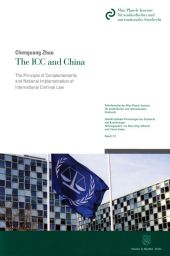 Neuerscheinungen 2017Stand: 2020-02-01 |
Schnellsuche
ISBN/Stichwort/Autor
|
Herderstraße 10
10625 Berlin
Tel.: 030 315 714 16
Fax 030 315 714 14
info@buchspektrum.de |

Chenguang Zhao
The ICC and China
The Principle of Complementarity and National Implementation of International Criminal Law
2017. XIV, 245 S. 224 mm
Verlag/Jahr: DUNCKER & HUMBLOT 2017
ISBN: 3-428-15195-X (342815195X)
Neue ISBN: 978-3-428-15195-0 (9783428151950)
Preis und Lieferzeit: Bitte klicken
A disconnection has historically existed between international and domestic justice. In China, international justice and domestic justice were long treated as two autonomous yet interconnected systems. With the establishment of the International Criminal Court (ICC) in 2002, the two systems began to increasingly work in tandem. The principle of complementarity is one of the cornerstones of the ICC´s architecture, according to which states have primary jurisdiction over the ICC. This research work focuses on the possible impact of the principle of complementarity on the implementation of international criminal law in China and the future prospects of the relationship between China and the ICC based on this analysis.
A disconnection has historically existed between international and domestic justice. In China, international justice and domestic justice were long treated as two autonomous yet interconnected systems, akin to the concept of Yin and Yang. With the establishment of the International Criminal Court (ICC) in 2002, the two systems began to increasingly work in tandem. The principle of complementarity is one of the cornerstones of the ICC´s architecture, according to which states have primary jurisdiction over the ICC. So long as the legal system of a state can efficiently investigate and prosecute the core international crimes prohibited in the Rome Statute, the ICC will not intervene. However, if a state is unwilling or unable to investigate and prosecute these crimes, the ICC will invoke the principle of complementarity to step in. Thus, the principle of complementarity has an impact on the national implementation of international criminal law, as well as on its exercise of jurisdiction in many aspects, including for third party states. As a third party state to the ICC, China has ratified a number of international conventions, including those on genocide and torture; China is therefore obliged to prosecute these international crimes by implementing these international conventions into national law. However, the core crimes have thus far not been incorporated into Chinese criminal law. This research work focuses on the possible impact of the principle of complementarity on the implementation of international criminal law in China as a third party state and the future prospects of the relationship between China and the ICC based on this analysis. By so doing, it aims to contribute to the discourse on complementarity for both scholars and practitioners.
Chapter 1: The Emergence and Development of Complementarity
The International Military Tribunals: the Nuremberg and Tokyo Trials - The UN ad hoc Tribunals for Former Yugoslavia and Rwanda (ICTY and ICTR) - The International Criminal Court and Complementarity
Chapter 2: The Rationale of Complementarity in the Rome Statute
The Nature and Role of Complementarity - Theorization and Analytical Dimensions of Complementarity - Complementarity in Practice - When Complementarity in Theory Meets Complementarity in Practice - Reconstructed Complementarity Criteria: Case-Specific Passive Complementarity and Situation-Specific Positive Complementarity
Chapter 3: National Implementation of International Criminal Law in China
China and International Criminal Law - The Theoretical and Legal Framework of Implementing International Criminal Law in China - Comment on the Chinese Model of Implementing International Criminal Law
Chapter 4: Complementarity and the National Implementation of International Criminal Law in China
Complementarity and China´s Sovereignty Concerns - China´s Ordinary Crime Approach under the Complementarity Test - Complementarity and Cooperation between China and the ICC
Chapter 5: Conclusion
The Concept and Application of Complementarity: Past Development and Present Trend


